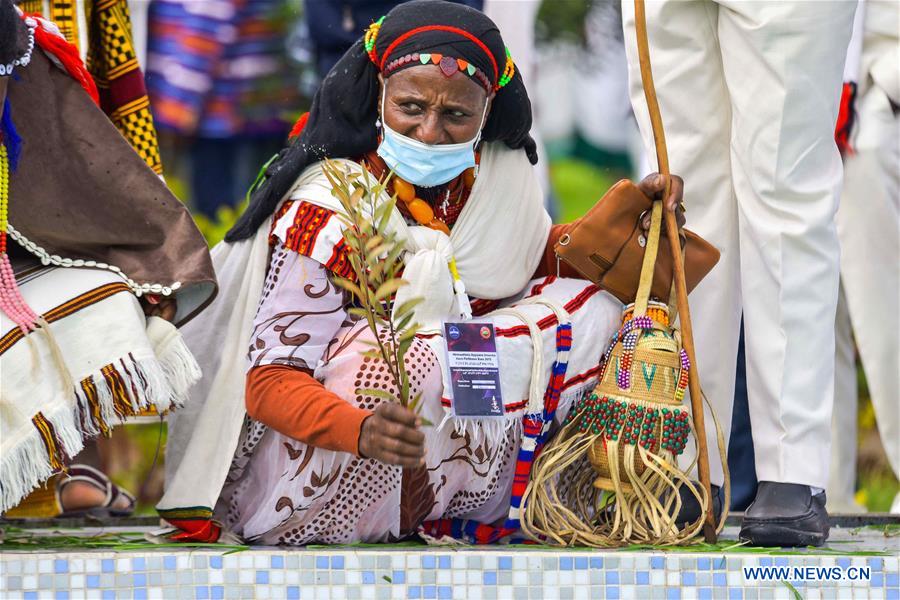
A woman of Oromo ethnic group takes part in a celebration of the Irreecha festival in Addis Ababa, capital of Ethiopia, Oct. 3, 2020. The Irreecha festival is an annual thanksgiving event celebrated by ethnic Oromos in Ethiopia to mark the end of the rainy season and the start of spring. (Xinhua/Michael Tewelde)
ADDIS ABABA, Oct. 3 (Xinhua) -- Hiwot Tesfaye, a diaspora-based Ethiopian, is excited to celebrate Irreecha festival, an annual thanksgiving event celebrated by millions of Ethiopians annually, for the first time in her home country.
"In past years, I have celebrated the Irreecha festival in the U.S. where I currently reside. However, it feels much better celebrating the beautiful festival in my home country with friends," Tesfaye told Xinhua.
"Today's Irreecha festival ceremony was beautiful. I hope in future editions it will see the participation of many more people," said Tesfaye.
The Irreecha festival is an annual thanksgiving event celebrated by ethnic Oromos to mark the end of the rainy season and the start of spring.
Oromos make up Ethiopia's single largest ethnic group, accounting for about 35 percent of the east African country's 107 million plus population.
The Ethiopian government imposed a 5,000 participants limitation to the number of participants allowed for the Saturday Irreecha ceremony held in the Ethiopian capital Addis Ababa to prevent the possible spread of COVID-19 disease.
Ethiopia has confirmed a total of 76,988 COVID-19 cases and 1,205 COVID-19 related deaths as of Saturday morning.
While Irreecha was originally celebrated exclusively by ethnic Oromos in recent years, a growing number of non-Oromo Ethiopians are also celebrating the popular festival.
One such participant is Kutaye Tusa, an ethnic Konso from southern Ethiopia who came nearly 1,000 kilometers away from his homeland to celebrate the festival in Addis Ababa.
"This is my first time attending the Irreecha festival. I'm attending the festival to show the solidarity between the brotherly Konso and Oromo people," Tusa told Xinhua.
"I came here not to celebrate my neighbor's festival, but rather a festival my people consider as their own," he further said.
Tusa said with Ethiopia currently facing the grave challenge of COVID-19 and the political and economic downturn caused by the pandemic, the festival offers a break from pressing current challenges.
"Irreecha festival symbolizes unity, love, brotherhood, forgiveness and reconciliation," said Tusa.
We're celebrating Irreeccha 2020, while dealing with the nationwide challenge of COVID-19 and protecting ourselves from exposure to the disease," Tusa told Xinhua.
While the still increasing COVID-19 cases across Ethiopia has meant Irreeccha this year is being celebrated with a limited number of people congregating, Tusa is already hoping to attend a much brighter festival next year.
"I'm already looking forward to celebrating Irreeccha 2021. I hope by the time Irreeccha 2021 comes around, we will be celebrating it with the health threat from COVID-19 overcome," Tusa told Xinhua.
Earlier on Saturday, Ethiopian Prime Minister Abiy Ahmed, himself an ethnic Oromo, released a statement expressing best wishes for Irreeccha festival attendees.
"Taking a lesson from yesterday, let's stand united for a better tomorrow," Ahmed said. Enditem



